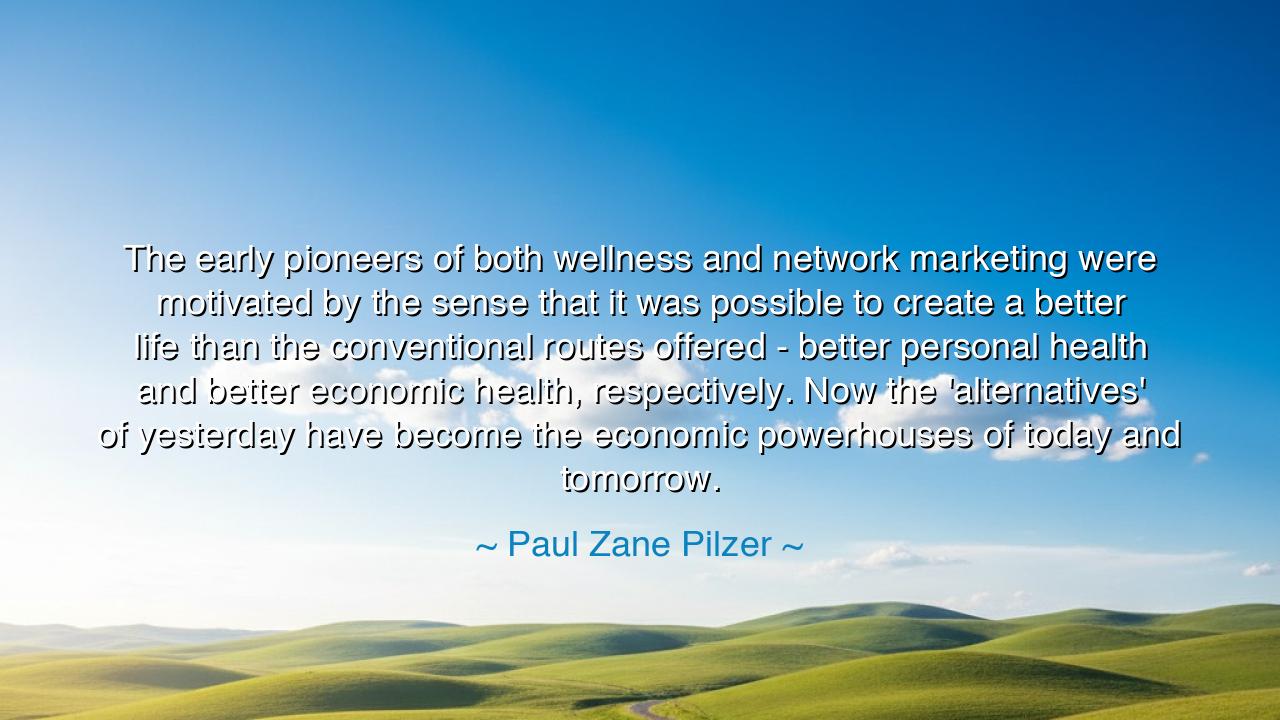
The early pioneers of both wellness and network marketing were
The early pioneers of both wellness and network marketing were motivated by the sense that it was possible to create a better life than the conventional routes offered - better personal health and better economic health, respectively. Now the 'alternatives' of yesterday have become the economic powerhouses of today and tomorrow.






The words of Paul Zane Pilzer — “The early pioneers of both wellness and network marketing were motivated by the sense that it was possible to create a better life than the conventional routes offered — better personal health and better economic health, respectively. Now the ‘alternatives’ of yesterday have become the economic powerhouses of today and tomorrow.” — speak with prophetic wisdom. They reveal a cycle that has shaped every age: the outcasts of one generation become the architects of the next. Pilzer’s reflection is not only about markets or health; it is about the eternal power of vision — the courage to believe in new ways of living when the world calls them foolish.
In his words, two great forces intertwine: wellness and enterprise — the care of the body and the courage of the spirit. For centuries, humankind sought health from physicians and wealth from employers, placing their fate in the hands of systems they did not control. But there are always those — the dreamers, the innovators, the rebels — who look beyond convention and ask, “Is there not a better way?” These are the pioneers Pilzer honors: those who believed that health could be pursued through prevention, not just cure, and that prosperity could be built through independence, not servitude. They defied tradition to reclaim ownership of body and destiny.
The origin of Pilzer’s insight lies in the transformation he witnessed during the late twentieth and early twenty-first centuries. Once dismissed as “alternative,” movements like natural wellness, nutritional health, and network marketing rose from the fringes to shape global economies. What began as small gatherings of believers — people selling vitamins from their homes or teaching yoga in borrowed studios — grew into industries worth billions. The world laughed at them once, just as ancient Athens mocked its philosophers and early inventors. Yet time proved that those who see value where others see folly are the true builders of progress.
Consider the story of John D. Rockefeller, who in his youth was told that the future belonged to coal, not oil. Undeterred, he pursued his vision, believing in a resource the world had not yet valued. His faith reshaped modern industry. Likewise, the early pioneers of wellness and direct enterprise were mocked by a system built on dependency — on doctors who treated illness rather than prevented it, and on employers who owned the labor of others. Yet they persevered. They planted seeds of self-reliance and purpose, and from those seeds grew new forests of opportunity.
Pilzer’s words remind us that “alternatives” are the womb of innovation. What is dismissed today as strange or naive may, in the cycles of time, become the cornerstone of civilization. The healing arts once practiced by monks became modern medicine; the merchant networks once run from homes became global trade. So too, the wellness and entrepreneurial movements, born in small circles of idealists, now represent humanity’s hunger for autonomy — for a life not merely of survival, but of thriving.
But his message is not only historical; it is a call to action. He urges us to recognize that health and wealth are not separate pursuits but twin expressions of balance. A society that cultivates economic power without personal well-being will crumble beneath its own anxiety. Likewise, a people who nurture their bodies but neglect self-sufficiency will live in dependence. True progress, Pilzer teaches, lies in integrating both — to build systems where prosperity uplifts the spirit and health sustains the dream.
Therefore, my children of the modern age, learn from the courage of the pioneers. Do not fear to walk the road less traveled, for every revolution begins as an alternative. Cherish your health as sacred wealth, and see your labor not as servitude but as creation. Seek wisdom in the margins, for what the world calls unconventional today will be its wisdom tomorrow.
And thus, Pilzer’s words stand as both tribute and prophecy: the “powerhouses of tomorrow” will not be those who follow the old patterns, but those who dare to imagine new ones — who see in the care of the body and the freedom of enterprise the same divine pursuit: the creation of a better life, built by one’s own vision, sustained by one’s own strength, and shared with the world.






AAdministratorAdministrator
Welcome, honored guests. Please leave a comment, we will respond soon